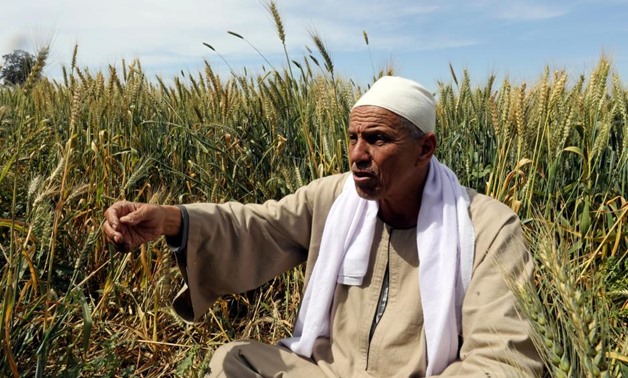
Farmer Mohamed Abdelkhaleq speaks during an interview with Reuters in a field in the Beheira Governorate, north of Cairo, Egypt April 4, 2018.
CAIRO – 4 September 2018: As part of the determined action to improve Egypt’s food security and wheat supplies, the government is setting a program to achieve food security, raise wheat storage capacity, ensure availability of wheat consumption and increase the efficiency of distribution.
The program aims to achieve self-sufficiency in the basic food commodities and reduce Egypt’s dependence on importing to meet the food requirements.
Under the program, the cultivated area will be increased from 16.7 million feddans in 2016/2017 to 18 million feddans by 2021/2022.
Additionally, the contract farming system will be extended for some crops, including wheat, sugarcane, potatoes, tomatoes, sugar beet and citrus along with oil plants, poultry and fish to boost food production and increase crop supplies to face the increasing demand.
The food security requirement program will improve the quality of irrigation and drainage system, develop collection, storage and marketing systems for the relevant crops, set standards for good food, ensure that food is not contaminated with pesticides, and determine the maximum limits of pesticide residues.
As for the wheat storage capacity, the government aims to raise the storage capacity to attain strategic wheat reserves estimated at 4.03 million tons compared to the current capacity of 2.9 million tons, which can be achieved by establishing 12 new metal silos for wheat storage in 19 governorates.
This comes as part of the Egyptian national program for 2018-2022 signed on April 24, 2018 with the United Nation’s Food & Agriculture Organization (FAO).
Minister of Agriculture and Land Reclamation Abdel Moneim el-Banna and Hussein Gaden, representative of the United Nation’s Food & Agriculture Organization (FAO), signed the framework.
Gaden said that the signed program comes in line with the sustainable development in Egypt Vision 2030 and the objectives of the FAO, as it focuses on achieving three priorities: improving agricultural productivity, raising food security in strategic commodities, and sustainable use of natural agricultural resources.
The FAO representative added that they will work on achieving the priorities through developing the national plans related to food security, expanding social security to include the rural areas, focusing on new technology to increase water production, coping with climate change, and ensuring the connection between water, energy and food.
He further noted that the organization will help Egypt reach its goals of sustainable development, especially in eliminating hunger.
This framework takes into consideration the Agricultural Operational Plan for Development, the main driver for achieving the 2030 sustainable development goals, which includes three components: institutional reforms, revision of agricultural policies, and development and investment programs, the agriculture minister said.
He affirmed that the FAO makes significant contributions in agriculture development projects and food security in Egypt.


Comments
Leave a Comment